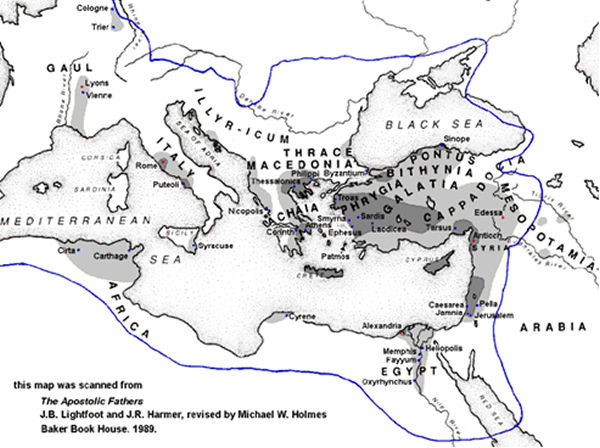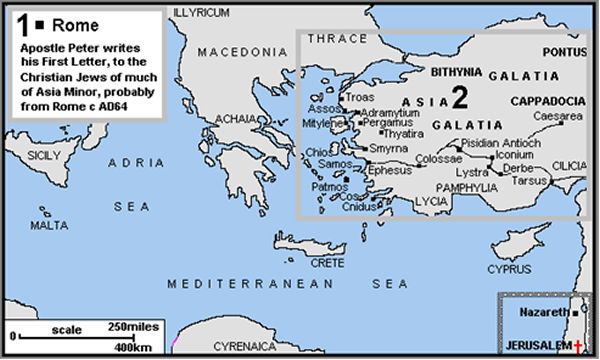1 Peter
In
Gentile and Jewish
Recipients Historical Background
There was persecution
(sporadic) but it had not become the official Roman Government position yet
After Nero’s burning of
Peter
Peter’s death occurred in
Peter’s death would have
occurred after 64 AD but by 67 AD
Place of Writing
It appears this letter was
written from
In 5:13 Peter writes, “She
who is in
The evidence not read “
a)
b)
c)
The writing
of 5:13 is not in a figurative sense.
Author
Peter has been accepted as
the author of this letter since the early days of the church.
It wasn’t until the corrupt
biblical criticism of the 1800’s became popular that anyone even mentioned that
Peter wasn’t the author.
In 2 Peter 3:1 Peter refers
to his former letter (1 Peter).
Clement refers to First Peter
in 95 AD
Polycarp (John’s disciple)
uses First Peter in his letter to the Philippians
Eusiebius, the church
historian from the 300’s, gives First Peter universal acceptance.
Irenaeus (140-203), Tertullian (150-222), Clement of Alexandria
(155-215) and Origen (185-253) all
credit Peter with the authorship of this letter.
Some critics have said the
style of Greek in this letter are beyond Peter’s ability since he was a
Galilean fisherman. But, Peter would
have spoken Greek and been very familiar
with it. Also, according to First Peter
5:12 Silas was the scribe who wrote
the book down for Peter:
“With the help (“through” or “by means
of”) of Silas, whom I regard as a
faithful brother, I have written to you briefly, encouraging you and testifying
that this it’s the true grace of God.
Stand fast in it.”
Date of Writing
This book would have been
written in between 63-65 AD
Peter appears to have been
familiar with Paul’s letters written from prison around 61-62.
Peter was martyred by Nero between 65-67 AD


NAS
1 Peter, an apostle of Jesus Christ, To those who reside as
aliens, scattered throughout
2 according to the foreknowledge of God
the Father, by the sanctifying work of the Spirit, to obey Jesus Christ and be
sprinkled with His blood: May grace and peace be yours in the fullest measure.
1:1
“apostle” (apostoloV) – an official representative who was appointed and authorized by the one doing the sending.
“elect” (eklektoV) – elect, from the verb form that means to pick out, to select. This word was used in the papyri to mean “select” or “choice”
Deuteronomy 14:2
“strangers” (parepidhmoV) – one who lives alongside of. A sojourner. A person living temporarily as a foreigner, staying for a while in a strange place.
See 2:11
“scattered” (diaspora) – means “dispersion, scattering,
diaspora” It is a word used of the
Jewish ciaspora that came from deportation and movement into foreign
lands. Here
Peter uses a term normally used for
1:2
“foreknowledge” (prognwsiV) – knowing beforehand, foreknowledge.
Compound Greek word:
a) “pro” meaning “before” and
b)“gnosis” meaning “knowedge
A term used
of